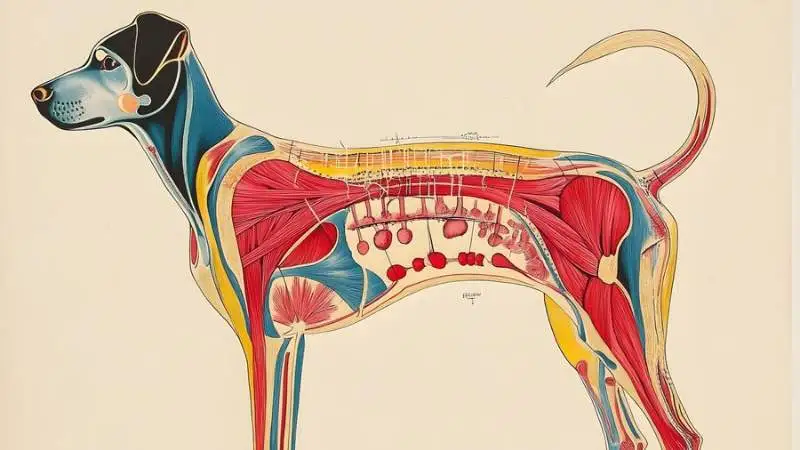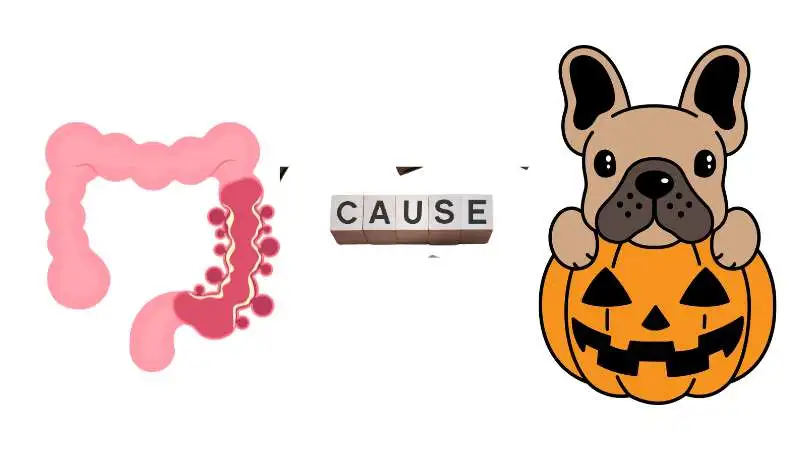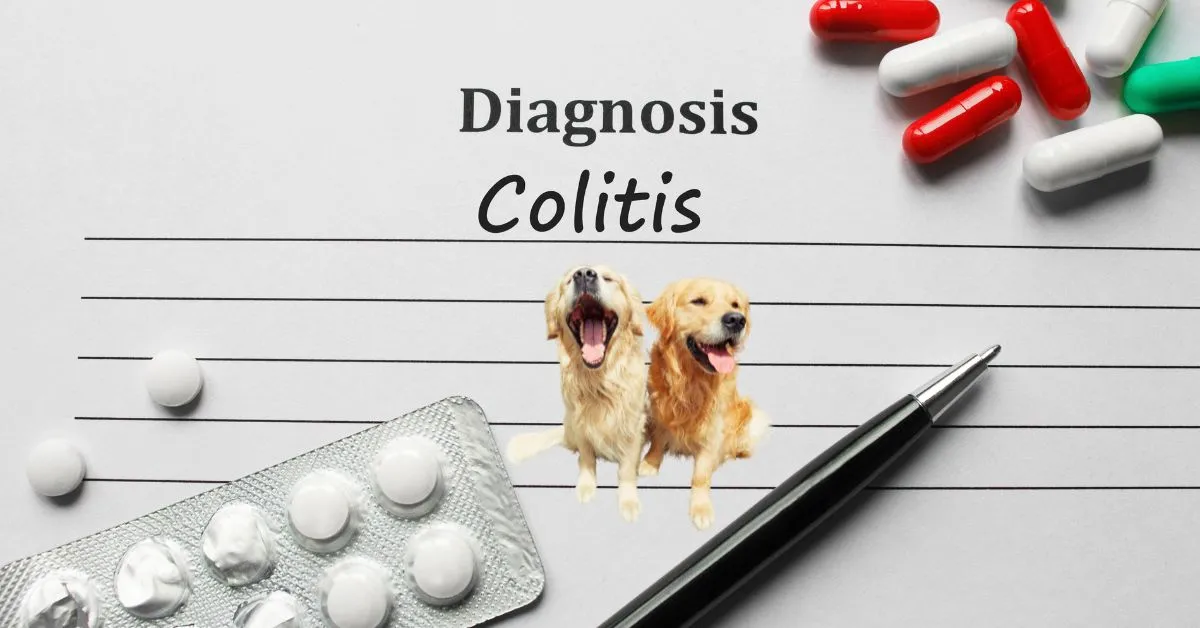When managing a specialist diet for dogs with colitis, it’s crucial to know what not to feed your furry friend to prevent toilet trouble and reduce diarrhoea symptoms. Once diagnosed, following a colitis-friendly diet that supports the digestive system is essential. Avoid foods and ingredients that are hard to digest, such as those high in fat or with artificial additives.
Instead, focus on a treatment plan with easily digestible meals. Staying informed and following a special diet can significantly enhance your puppy’s health and happiness. Always consult your vet to tailor the best diet plan for your dog’s health conditions.
What is colitis?
Colitis in dogs is an inflammation of the colon, leading to symptoms such as severe toilet issues, including diarrhoea, constipation, and the presence of blood and mucus in their poop. This condition can be triggered by food allergies, illnesses, autoimmune disorders, or stress, which could result in long-term affliction or short bursts of symptoms. It is often exacerbated when a pooch consumes the wrong foods.
Understanding and managing these triggers is essential in alleviating their discomfort. Providing an appropriate diet tailored to their needs plays a significant role in managing colitis effectively.
Causes of colitis in dogs
Many factors can contribute to the development of colitis in dogs. Dietary influences such as sudden changes in diet, food intolerances, and allergies can make dogs more susceptible to this condition. spoiled or contaminated foods are common triggers and should be carefully avoided.

Stress and anxiety can exacerbate signs, such as infections and parasites, which disrupt the digestive device. Inflammatory bowel disorder is another potential underlying reason for colitis. Additionally, certain medications can worsen or trigger colitis in sensitive dogs.
Identifying the exact cause is critical to formulating an effective treatment plan, ensuring a tailored approach that addresses the beautiful needs of each canine.
Signs of colitis in dogs
Dogs with colitis frequently display significant signs and symptoms that may substantially impact their well-being. Typical symptoms include frequent diarrhoea, which may consist of blood and mucus, and straining at some stage in excretion, a clear indication of abdominal ache and soreness.
Affected dogs may additionally lose their appetite, leading to weight loss and an elevated chance of dehydration if the condition continues untreated. Prompt veterinary interest is essential when those signs arise.
Read more : Wet Dog Food Calculator
The veterinarian will carry out a complete bodily examination and may suggest diagnostic tests to discover the underlying motive, considering the development of an effective treatment plan to manipulate the circumstance and prevent similar headaches.
What triggers colitis in dogs?
A variety of factors can trigger colitis in dogs. Stress is a common cause, often linked to environmental or routine changes. Dietary changes, infections, parasites, and certain medications can exacerbate the condition, leading to colon inflammation.
Consulting with a veterinarian to identify potential triggers is crucial for effective management. Understanding each dog’s unique needs and sensitivities can help mitigate these triggers and reduce the frequency of colitis episodes.
Can diet help colitis?
Nutrition plays a critical role in managing colitis in dogs. A carefully controlled diet that is easy to digest and low in fat can assist in lessening irritation within the digestive tract and alleviating signs and symptoms, which include diarrhoea and abdominal pain. Incorporating fibre can regulate bowel movements and promote healthy digestion.
Veterinarians often recommend a prescription diet tailored to the dog’s specific needs and may include supplements to support their health further. Identifying foods that trigger symptoms is essential, allowing dog owners to avoid them and ensure a balanced diet that fosters well-being and minimizes the risk of colitis flare-ups.
Choosing the Best Dog Food for Colitis
When choosing the best dog food for a puppy with colitis, it’s essential to focus on recipes designed to support their sensitive digestive tract. Limited-ingredient diets are often recommended, as they contain fewer ingredients, which minimizes the chances of allergic reactions or intolerances. Opting for high-quality protein sources, such as pork, buffalo, or duck, can be beneficial since these novel proteins are less likely to trigger allergies.
Additionally, selecting diets with limited grains and without fillers can reduce digestive strain. Prescription diets formulated with delivered fiber can, in addition, promote digestive health by using support to regulate bowel movements and reduce infection. These diets may also include prebiotics to support beneficial gut bacteria, aiding overall digestion.
Veterinarians often recommend novel protein diets, particularly if dietary allergens or intolerances are suspected. Integrating these into your dog’s diet can play a significant role in alleviating colitis symptoms. Always consult your veterinarian to find a diet that caters to your dog’s needs and ensures they receive the nutrients necessary for good health.
Dog breeds prone to colitis.
Certain dog breeds are more inclined to develop colitis than others due to genetic predispositions or specific physical traits. Among the breeds most prone to colitis are German Shepherds, Boxers, Cocker Spaniels, Bulldogs, and Labrador Retrievers. When afflicted, these breeds may exhibit frequent diarrhoea, discomfort, and weight loss.
Managing colitis in these breeds requires keen observation of symptoms and tailored care that addresses each dog’s unique needs. Understanding the individual requirements of these breeds can help pet owners implement effective management strategies that mitigate symptoms and improve their dog’s quality of life.
Pumpkin for colitis in dogs

Incorporating pumpkin into a dog’s diet can be beneficial for managing colitis, thanks to its rich fiber content, which aids in regulating bowel movements and promoting healthy digestion. Pumpkin is also packed with antioxidants and essential nutrients that support overall health.
Using plain, canned pumpkin without any added sugars or spices is crucial, as pumpkin pie filling may contribute to digestive upset. Introducing small amounts of pumpkin can be as effective as a food treat or a dietary supplement. However, it’s always wise to consult a veterinarian when making dietary changes to ensure they’re appropriate for your pet’s needs.
Does colitis in dogs ever go away?
The analysis of colitis in dogs largely depends on the underlying motive and severity of the signs and symptoms. While some cases of colitis might also resolve with well-timed veterinary intervention and management, others can also continue, requiring ongoing remedy and lifestyle changes.
With proper care and management, many puppies can live glad, healthful lives regardless of a colitis prognosis. Regular veterinary check-united States of America is crucial in coping with the circumstance efficaciously and ensuring excellent results for affected dogs.
How do vets treat colitis in dogs?
Veterinarians approach the treatment of colitis in dogs by first identifying and addressing the underlying cause. Dietary changes are often recommended, emphasizing easily digestible, low-fat foods with adequate fiber to soothe the colon.
In cases where stress may be a trigger, stress management techniques are employed. Vets may prescribe a digestible prescription diet while avoiding irritants. Probiotics and supplements can bolster digestive health, and medications are prescribed in cases of infections or parasites. Severe cases might necessitate hospitalization for supportive care, including intravenous fluids to manage dehydration and electrolyte imbalances.
What food can I give my dog with colitis?
Selecting a diet that supports digestive health is essential to manage colitis in dogs. Premium-quality, specialist dog foods designed for sensitive digestion and gastrointestinal issues are recommended.
These foods are high in fiber and low in fat, promoting a nourishing environment for the digestive system. For some dogs, a homemade diet may be suitable, provided it meets the dog’s dietary needs and nutritional balance, and this should be done under the guidance of a vet or pet nutritionist. Proper hydration is also vital, so consider offering wet foods or adding warm water to dry foods to help maintain adequate water consumption.
Grain-free dog food for colitis
Dogs suffering from colitis and potential food allergies may benefit from a grain-free diet. Specialist grain-free dog foods often feature alternative protein sources such as salmon or herring and include probiotics and prebiotics to aid gut health.
Ingredients like apple pulp can provide dietary fiber, while tummy-sensitive recipes ensure digestive comfort with lean turkey, white fish, and vegetables. Including natural probiotic supplements can further support gut health, but always consult a vet to develop an effective dietary combination for your dog.
Ingredients to Avoid

In formulating a diet for dogs with colitis, certain ingredients should be avoided to prevent worsening the condition. High-fat foods, simple carbohydrates, fatty dog treats, human leftovers, and sugary substances can disrupt the digestive system.
Common food allergens such as grains, red meat, and dairy should also be avoided, particularly for dogs with sensitive digestive systems. Choosing high-quality foods free from preservatives, excess sugars, and unnecessary fillers is essential. Consulting with a vet will help identify specific ingredients that may trigger symptoms and need to be excluded from your dog’s diet.
Transitioning to a colitis-friendly diet
Transitioning a dog to a colitis-friendly diet requires a gradual approach to allow the digestive system to adjust to new foods. Begin with bland foods, slowly introducing new items while monitoring for triggers or allergic reactions.
Observe the dog’s behavior and bowel movements closely to detect colitis symptoms, such as lethargy or bloating. Veterinary guidance is crucial during this process, ensuring that diet changes complement medical treatment and regular vet check-ups. A carefully tailored diet that considers the dog’s physical needs will help achieve successful management of colitis.
Conclusion
Ultimately, ensuring proper nutrition is critical in managing colitis and supporting overall digestive health in dogs. A diet rich in high fiber, low fat, and easily digestible ingredients, often found in specialist dog foods, can help alleviate gastrointestinal issues.
Paying attention to food allergies and using probiotics and prebiotics can enhance digestive function. Maintaining hydration through wet foods and oral hydration solutions is also essential. When necessary, regular vet check-ups, dietary adjustments, and appropriate medication play a pivotal role in enhancing a dog’s health, well-being, and quality of life.
FAQs
What is the best food for a dog with colitis?
A bland, easily digestible diet is typically recommended for dogs with colitis. This often includes boiled chicken, white rice, or pumpkin. High-fiber foods can also help regulate digestion and firm up stools. Always consult your veterinarian to create a diet plan tailored to your dog’s specific needs.
Is boiled chicken good for dogs with colitis?
Yes, boiled chicken is an excellent option for dogs with colitis. It is lean, high in protein, and easy to digest. Ensure the chicken is plain, without any seasoning, oils, or spices, as these can irritate the digestive system. Pairing it with white rice can make a balanced, gentle meal.
What foods should be avoided for dogs with colitis?
Avoid foods that can irritate the digestive system, such as:
High-fat foods
Dairy products
Spicy or seasoned foods
Artificial additives and preservatives
Grains like wheat or corn (if your dog is sensitive)
Certain proteins that may trigger allergies (e.g., beef or lamb)
Is rice safe for dogs with colitis?
Yes, white rice is generally safe and recommended for dogs with colitis. It is easy to digest and helps firm up stools. However, avoid overfeeding rice, as excessive carbohydrates can disrupt the diet balance. Brown rice is higher in fiber and may be suitable for some dogs, but it can be harder to digest for others.
Can I feed my dog pumpkin for colitis?
Yes, plain, canned pumpkin (not pumpkin pie filling) is often recommended for dogs with colitis. It is high in fiber, which can help regulate digestion and firm up stools. Start with small amounts to avoid overloading the digestive system.
